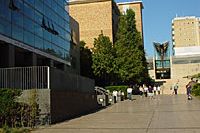| Planning - 3360 |
|
|||||||||||||||||||||||||||||||||||||||||||

Program Summary
The Bachelor of Planning program provides academic education and applied learning leading to professional qualifications in planning. The program is of four years full time duration with an additional mandatory year of work experience, normally taken after completing Session 1 of Year 3.
Planning has as its focus the management and development of urban and rural areas; ranging from small local precincts to metropolitan areas and regions. The planner's task is often to integrate and coordinate the aims and actions of a large number of government and private organisations and individuals to provide an equitable and efficient distribution of resources. Working at the interface of development and the environment, this involves collecting and analysing information; identifying needs and options; making forecasts; preparing policies, plans and programs for implementation; exercising development control; investigating development proposals; and evaluating results, communicating outcomes and consultation. Program Objectives and Learning Outcomes The objectives of the program are to create an awareness of the context in which planning operates, impart knowledge of how planning can influence the community and the physical environment, equip students with the competence to apply this knowledge at different levels in a wide range of situations, create an understanding of the contribution other disciplines can make to planning and vice versa, and develop skills in policy formulation, land use allocation and control, design and communication.
The program is structured to allow students to study a secondary specialisation in a particular area or to sample a wide range of educational experiences from across the University. Year 1
Session 1
Session 2
Year 2
Session 1
Session 2
Year 3
Session 1 Session 2
Year 4
Session 1
Session 2
Year 5
Session 1
Session 2
Program Minor
Students are strongly encouraged to use the elective courses to develop a specialisation in addition to their core planning studies. Honours are awarded in the Bachelor of Planning degree on the basis of quality of performance throughout the whole program and in accordance with current faculty policy. For the purpose of calculating Honours at graduation, the Honours value of each course is indicated by the units of credit associated with that course. Units of credit generally reflect the workload required of students in courses in which grades are awarded. Honours grades are Class 1, Class 2 Division 1, or Class 2 Division 2.
1. The degree of Bachelor of Planning is awarded at either Pass or Honours level after the successful completion of a minimum of 240 units of credit.
2. To fulfil these requirements, students must complete:
3. The standard duration of the program is 5 years, consisting of 8 sessions of full-time study plus 2 sessions of required work experience, with each session worth 24 units of credit.
4. General Education courses may not be taken before a student enters Year 2 of the program. Work Experience
During the program, students must undertake 48 weeks of approved employment related to the program. The program assists with placements in state government agencies, planning consultants, private firms, and local councils. This is normally undertaken in the twelve months following Session 1 of Year 3 as indicated in the Program Schedule. Work experience requirements must be completed prior to graduation. The type of employment proposed must be submitted to the Program Head for approval. Progression Courses are to be taken in the year sequence listed above, except with the permission of the Head of the Planning and Urban Development Program. For information regarding fees for UNSW programs, please refer to the following web-page: https://my.unsw.edu.au/student/fees/FeesMainPage.html
The Bachelor of Planning Degree is recognised by the Planning Institute of Australia as an academic qualification for Corporate Membership after at least one additional year of practical experience following graduation. Corporate Membership of the Planning Instituteof Australia confers reciprocal recognition in many countries.
Area(s) of Specialisation |
||||||||||||||||||||||||||||||||||||||||||||

| Contacts | Library | myUNSW | WebCT |